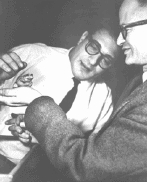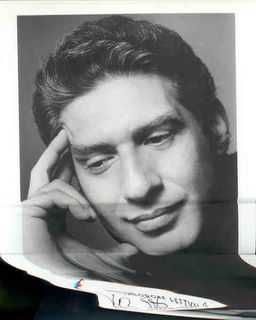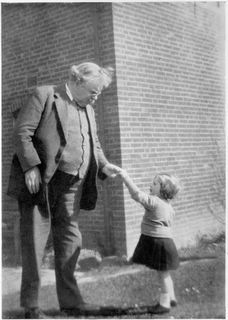Comments are welcome.
All material on this site that is not otherwise attributed is:
© 2003 - 2017 David W. Lettvin, All rights reserved.
Monday, October 03, 2005
I Am A Terrorist
Out of the depths
Wednesday, July 27, 2005
Tuesday, July 26, 2005
The conscience of a pharmacist
Wednesday, July 20, 2005
An Omelette Recipe
Wednesday, July 13, 2005
Mad URL
Tuesday, July 12, 2005
Condi
To Mrs. Professor in Defense of My Cat's Honor and Not Only
Tuesday, June 28, 2005
A New Favorite Quote or Two
When forty winters shall beseige thy brow, And dig deep trenches in thy beauty's field, Thy youth's proud livery, so gazed on now, Will be a tatter'd weed, of small worth held: Then being ask'd where all thy beauty lies, Where all the treasure of thy lusty days, To say, within thine own deep-sunken eyes, Were an all-eating shame and thriftless praise. How much more praise deserved thy beauty's use, If thou couldst answer 'This fair child of mine Shall sum my count and make my old excuse,' Proving his beauty by succession thine! This were to be new made when thou art old, And see thy blood warm when thou feel'st it cold. Limerick 2 When your skin is like old corduroy, And your youth Father Time did destroy, She says, "You're no beauty!" You tell her, "Hey cutie, To see me, just you look at my boy.
Friday, June 24, 2005
Blog quirks
Wednesday, June 22, 2005
Anatomy of Melancholy
LimeRickey
Monday, June 20, 2005
A brief word about editorial privilege
Sunday, June 19, 2005
Launching a thousand ships?
A Single Shell Organism
Where there's a Will there's a limerick
When, in disgrace with Fortune and men's eyes, I all alone beweep my outcast state, And trouble deaf heaven with my bootless cries, And look upon myself and curse my fate, Wishing me like to one more rich in hope, Featured like him, like him with friends possessed, Desiring this man's art, and that man's scope, With what I most enjoy contented least, Yet in these thoughts myself almost despising, Haply I think on thee, and then my state, Like to the lark at break of day arising From sullen earth, sings hymns at heaven's gate For thy sweet love remembered such wealth brings, That then I scorn to change my state with kings.Which is all well and good, but it's verbose and in sonnet form. Sonnets are merely limericks that need to go on a diet. Limerick #29
When alone I can get sort of blue, And jealous of those with a clue, I might wish I were smart Or had some kind of art, Then I think that I'm rich to have you.
Laundry day
Saturday, June 18, 2005
Change in the look
Friday, June 17, 2005
My Study

Jerry Lettvin and Walter Pitts talking with their collaborator Rana Pipiens.

Concert pianist and legendary teacher Theodore Lettvin gazes moodily down at the corner of a badly scanned photograph.

G.K. Chesterton accepting the gift of a dandelion from a young admirer.
I'm my own ...
Private England
When you're a Fed
West Side Story
Bill Clinton in Slumberland
Are you tucked into your bed? The battle fought, the country led, For all good boys should be asleep Your fantasies in dreams to keep. Don't let them out to take the air For everyone will want to share. The fun they'll poke, the games they'll play, (They'll want to play them every day). Your inner needs will be a joke, Your plans and power up in smoke. Your work supplanted by the sleaze Of a woman on her knees. Too late. Those dreams are running free Providing grist for mills like me. So dream away the old dream's tar With what you wish upon a Starr.
Sunday, June 05, 2005
Singular Statements
Genocide
Thirst
Mojo Hand
Circles of Hell
Adversity
The Frog Pond
Cold Spring
Make Way
An Unfulfilled Passion
Long ago and far away (oh, my best beloved) there was a student of limited resource and capacity. He lived in the vale of Washington University, set about by phallic symbols made of the teeth of elephant children. These towers protected the land from the intellectual desert of St. Louis.
At night, he huddled in a small cave hung with posters and mobiles, and eye-catching items of more than oriental splendor. But when the sun rose, he placed upon his back the coat of morning and ventured forth in his guise of "The Elementary Penguin", to tell stories and soothe the hallucinatory dreams of those who had eaten of the mushroom or tasted the blotter.
One day the Penguin was seated in the cool shade of the student union (a coming together which was devoutly to be hoped for), contemplating navels other than his own, when he noticed a creature that resembled a long hairy ... ummm ... let us say 'sausage' (best beloved). The creator of all things had seen fit to place short stubby legs upon this animated sausage, two before and two behind. Above the forelegs rose a head that seemed too big for the rest of the creature.
The Penguin regarded the creature with 'satiable curiosity, wagering with himself as to the moment that the head would overbalance the body and, pivoting on its forelegs, the wiener dog Max (for indeed it was that very animal) would tip forward and flip end over end down the slope which led down from the student union to the swamp known as 'the residential halls'.
But as he studied Max he realized that there was indeed a counter-balance dangling from the rear of the creature. A counter-balance which even in repose seemed to clear the ground by only the faintest fraction of the smallest fragment of an inch. Sipping from the potent caffeinated beveraqe which was his usual if not sole sustenance. He watched the animated sausage at play in the field, and pondered the irritation and pain that would be the lot of an extruded member so proximal to the ground.
As the sun rose higher, the Penguin recorded the approach of a long-haired female, more of Max's persuasion than of the Penguin's, yet extraordinarily different. The Penguin muttered "is Timmy in the well?" under his breath.
Max had become aware of the presence of the female and turgidly produced a pink sausage that seemed to cling remora-like to its supporter. It did, as the Penguin winced to recognize, drag along the ground, scraping through stones, sand and grass clippings leaving a shallow ditch. The Penguin, as was his wont, took a simple-minded delight that the word ditch appeared in relation to the female, and immediately started casting about for other rhymes.
She, in the meantime, had found some shade beneath a dying maple and lay there panting, overheated in a multiplicity of ways. Max, with his enormous pink plow, furrowed the field as he slipped up behind.
He attempted. The lass looked over her shoulder with disdain and dislodged the intruder through the simple expedient of standing up. She moved to another patch of shade, but Max came grooving through the fields to try again ... and again ... and again. After thirty minutes the field looked like a trigonometrician's blackboard. Max's excitement was intense and he had been leaving trails of genetic material in the furrows. The penguin pondered this, realizing that to the vector belong the spills.
At last more in furrow with his hanger, Max watched as the object of his affections trotted away to find a more private place to repose. The Penguin watched as Max's spirits wilted. Sadly, that was all that wilted, and for some time the animated weiner wandered forlornly, leaving a map of his sorrow.
The Penguin ordered an iced drink poured it into a bowl, placed it on the ground and called Max over. He wondered which end would be in the bowl. Max lapped at it gratefully and the Penguin enjoyed a Cat Stevens moment for he had provided 'tea for the tillerdog'.
Saturday, January 29, 2005
Pish on posh
Common Tears
The Joke
I sit on a bench, Amused by knowing that it is my cigarette That gets me out of the office, Pushes me out amongst the living, To anthropologize in the park. I know I seem receptive, so when a man In raggedy clothes comes up to me It’s just a matter of waiting for the opening line. When it comes, it’s excellent. “Tell you a joke for a buck?” Cool, very cool . . . I hand him a dollar. He tells me a joke, But doesn’t finish it. And turns to walk away. I say, “Hey that wasn’t funny.” He says, “The punch-line will cost you five.” I laugh and give it to him. He laughs and tells me the punch-line. We both laugh and he walks away. It was an old joke, But I was happy to hear it again. It was worth the money To hear it told that way.
